

World War II in Europe Timeline: The Blitz. The Blitz refers to the strategic bombing campaign conducted by the Germans against London and other cities in England from September of 1940 through May of 1941, targeting populated areas, factories and dock yards.
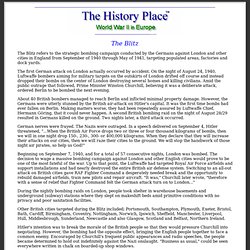
The first German attack on London actually occurred by accident. On the night of August 24, 1940, Luftwaffe bombers aiming for military targets on the outskirts of London drifted off course and instead dropped their bombs on the center of London destroying several homes and killing civilians. Amid the public outrage that followed, Prime Minister Winston Churchill, believing it was a deliberate attack, ordered Berlin to be bombed the next evening.
About 40 British bombers managed to reach Berlin and inflicted minimal property damage. History - British History in depth: The Blitz: Sorting the Myth from the Reality. The Blitz and World War Two. What was the blitz? An air raid siren will play automatically on this page.
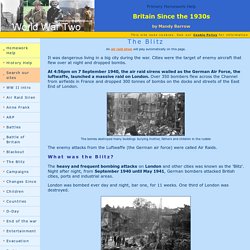
It was dangerous living in a big city during the war. Cities were the target of enemy aircraft that flew over at night and dropped bombs. The London Blitz, 1940. The London Blitz, 1940 The appearance of German bombers in the skies over London during the afternoon of September 7, 1940 heralded a tactical shift in Hitler's attempt to subdue Great Britain.
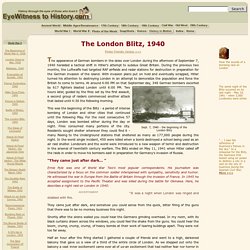
During the previous two months, the Luftwaffe had targeted RAF airfields and radar stations for destruction in preparation for the German invasion of the island. With invasion plans put on hold and eventually scrapped, Hitler turned his attention to destroying London in an attempt to demoralize the population and force the British to come to terms. At around 4:00 PM on that September day, 348 German bombers escorted by 617 fighters blasted London until 6:00 PM. Two hours later, guided by the fires set by the first assault, a second group of raiders commenced another attack that lasted until 4:30 the following morning.
The Battle of Britain. Battle of Britain. Battle of Britain. The Battle of Britain (German: Luftschlacht um England, literally "Air battle for England") is the name given to the Second World War air campaign waged by the German Air Force (Luftwaffe) against the United Kingdom during the summer and autumn of 1940.
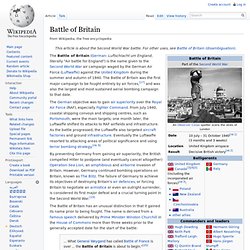
The Battle of Britain was the first major campaign to be fought entirely by air forces,[17] and was also the largest and most sustained aerial bombing campaign to that date. The German objective was to gain air superiority over the Royal Air Force (RAF), especially Fighter Command. From July 1940, coastal shipping convoys and shipping centres, such as Portsmouth, were the main targets; one month later, the Luftwaffe shifted its attacks to RAF airfields and infrastructure.
Blitz. Un article de Wikipédia, l'encyclopédie libre.
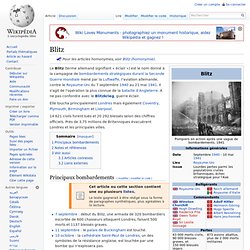
Le Blitz (terme allemand signifiant « éclair ») est le nom donné à la campagne de bombardements stratégiques durant la Seconde Guerre mondiale mené par la Luftwaffe, l'aviation allemande, contre le Royaume-Uni du 7 septembre 1940 au 21 mai 1941. Il s'agit de l'opération la plus connue de la bataille d'Angleterre. À ne pas confondre avec le Blitzkrieg, guerre éclair. 14 621 civils furent tués et 20 292 blessés selon des chiffres officiels. Près de 3,75 millions de Britanniques évacuèrent Londres et les principales villes. Principaux bombardements[modifier | modifier le code] Alerte aérienne ; population réfugiée dans le métro L'attaque des centres de productions industriels incluant des populations civiles dans un cadre de destruction stratégique sera reprise par les Alliés sur une échelle bien supérieure.
The Blitz. The Blitz (from German, "lightning") was the period of sustained strategic bombing of the United Kingdom by Nazi Germany during the Second World War.
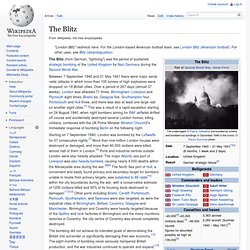
Between 7 September 1940 and 21 May 1941 there were major aerial raids (attacks in which more than 100 tonnes of high explosives were dropped) on 16 British cities. Over a period of 267 days (almost 37 weeks), London was attacked 71 times, Birmingham, Liverpool and Plymouth eight times, Bristol six, Glasgow five, Southampton four, Portsmouth and Hull three, and there was also at least one large raid on another eight cities. This was a result of a rapid escalation starting on 24 August 1940, when night bombers aiming for RAF airfields drifted off course and accidentally destroyed several London homes, killing civilians, combined with the UK Prime Minister Winston Churchill's immediate response of bombing Berlin on the following night. Bataille d'Angleterre.
Un article de Wikipédia, l'encyclopédie libre.
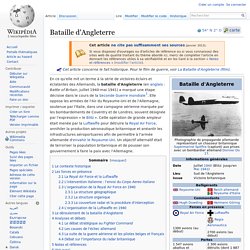
En ce qu'elle mit un terme à la série de victoires éclairs et éclatantes des Allemands, la bataille d'Angleterre (en anglais : Battle of Britain, juillet 1940-mai 1941) a marqué une étape décisive dans le cours de la Seconde Guerre mondiale[1]. Elle opposa les armées de l'Air du Royaume-Uni et de l'Allemagne, soutenue par l'Italie, dans une campagne aérienne marquée par les bombardements de Coventry et de Londres, souvent désignée par l'expression « le Blitz ».
Cette opération de grande ampleur était menée par la Luftwaffe pour détruire la Royal Air Force, annihiler la production aéronautique britannique et anéantir les infrastructures aéroportuaires afin de permettre à l'armée allemande d'envahir le Royaume-Uni. Un objectif alternatif était de terroriser la population britannique et de pousser son gouvernement à faire la paix avec l'Allemagne. Le contexte historique[modifier | modifier le code] Battle of Britain.
The Battle of Britain was a struggle between the German Luftwaffe (commanded by Hermaan Göring) and the British Royal Air force (headed by Sir Hugh Dowding’s Fighter Command) which raged over Britain between July and October 1940.
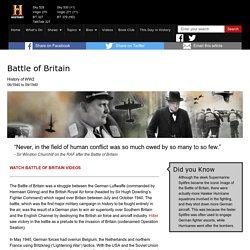
Battle of Britain - World War II. On June 17, 1940, the defeated French signed an armistice and quit World War II.
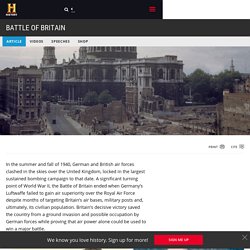
Britain now stood alone against the power of Germany’s military forces, which had conquered most of Western Europe in less than two months. But Prime Minister Winston Churchill rallied his stubborn people and outmaneuvered those politicians who wanted to negotiate with Adolf Hitler. History - The Battle of Britain (pictures, video, facts & news)